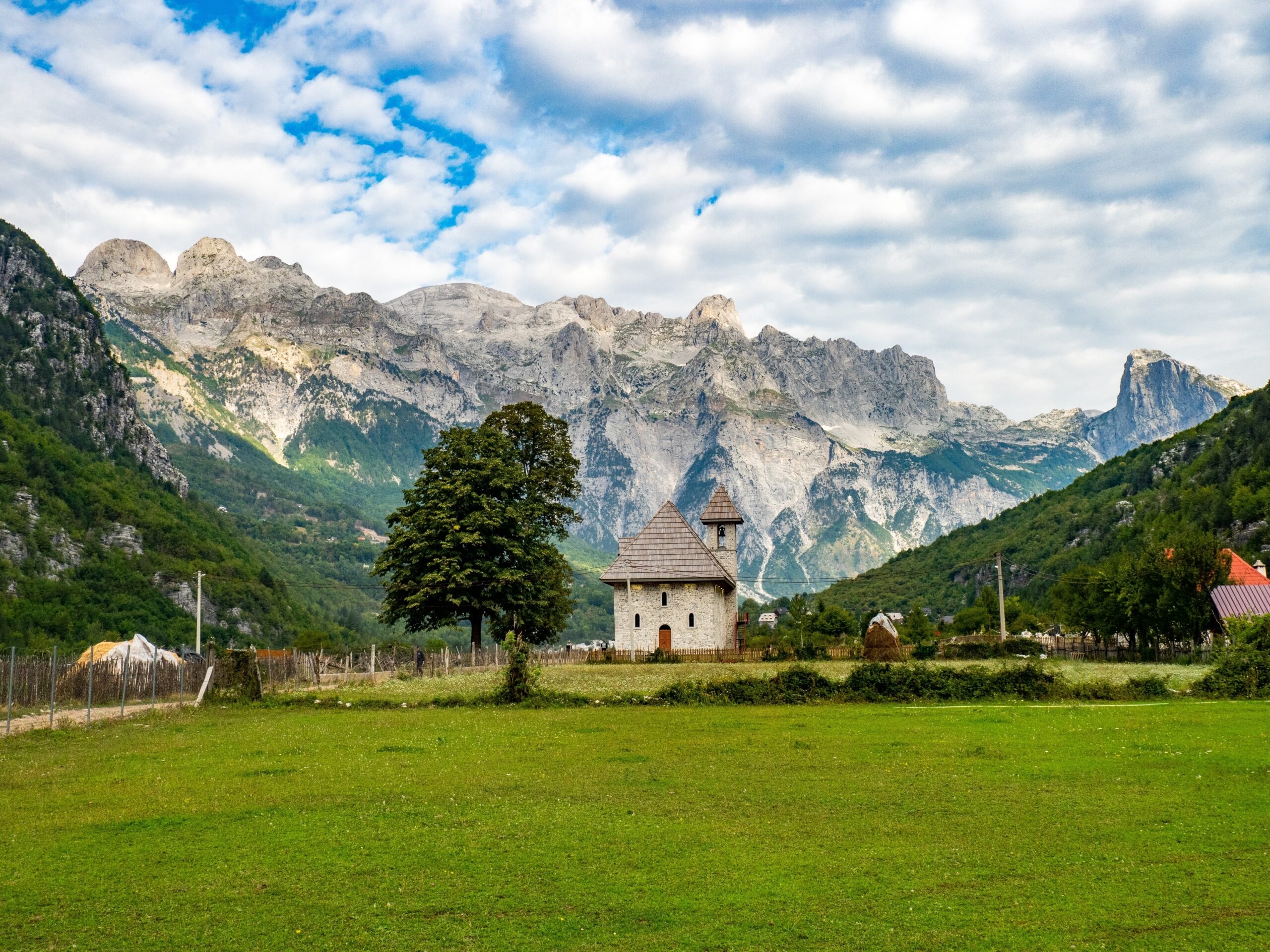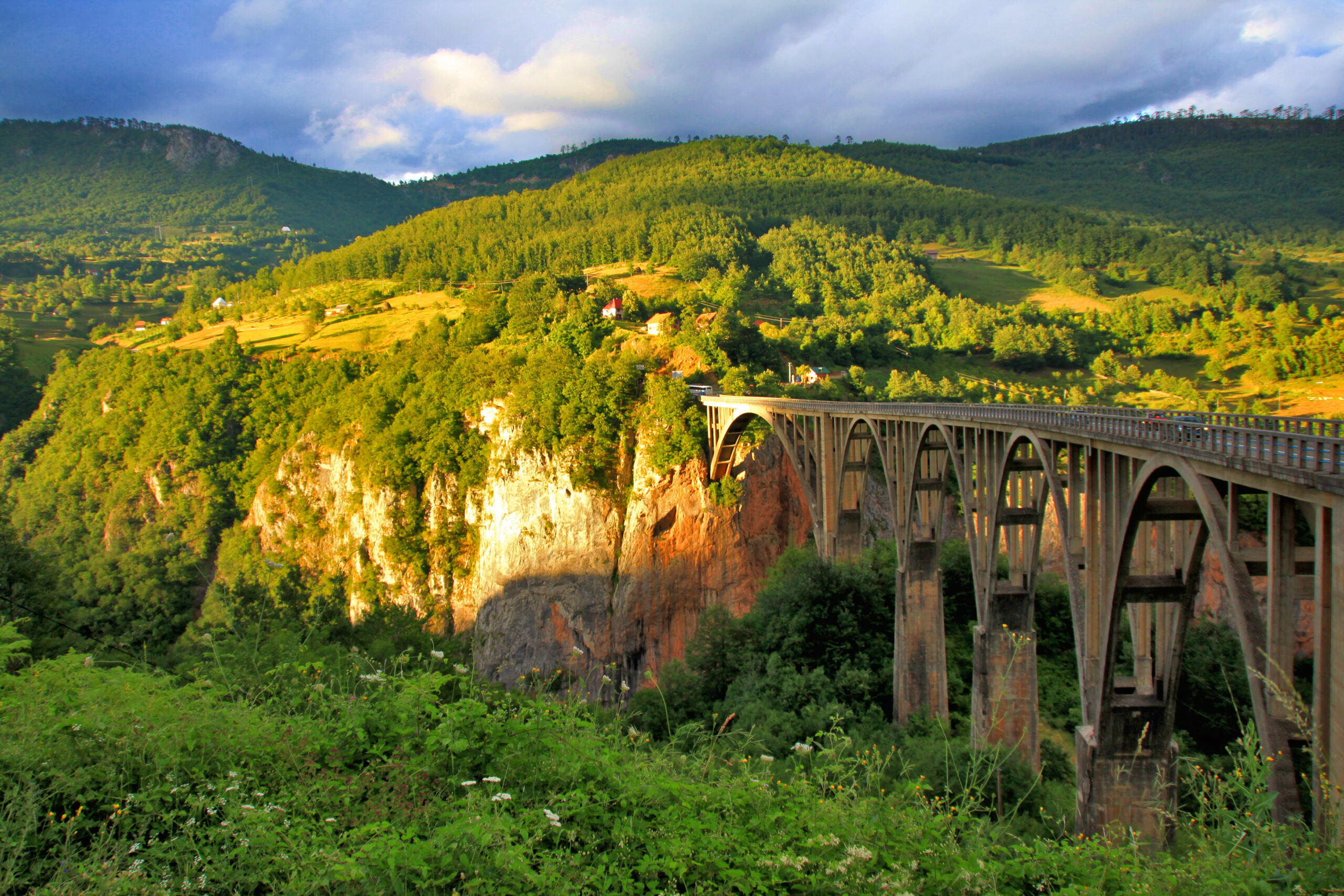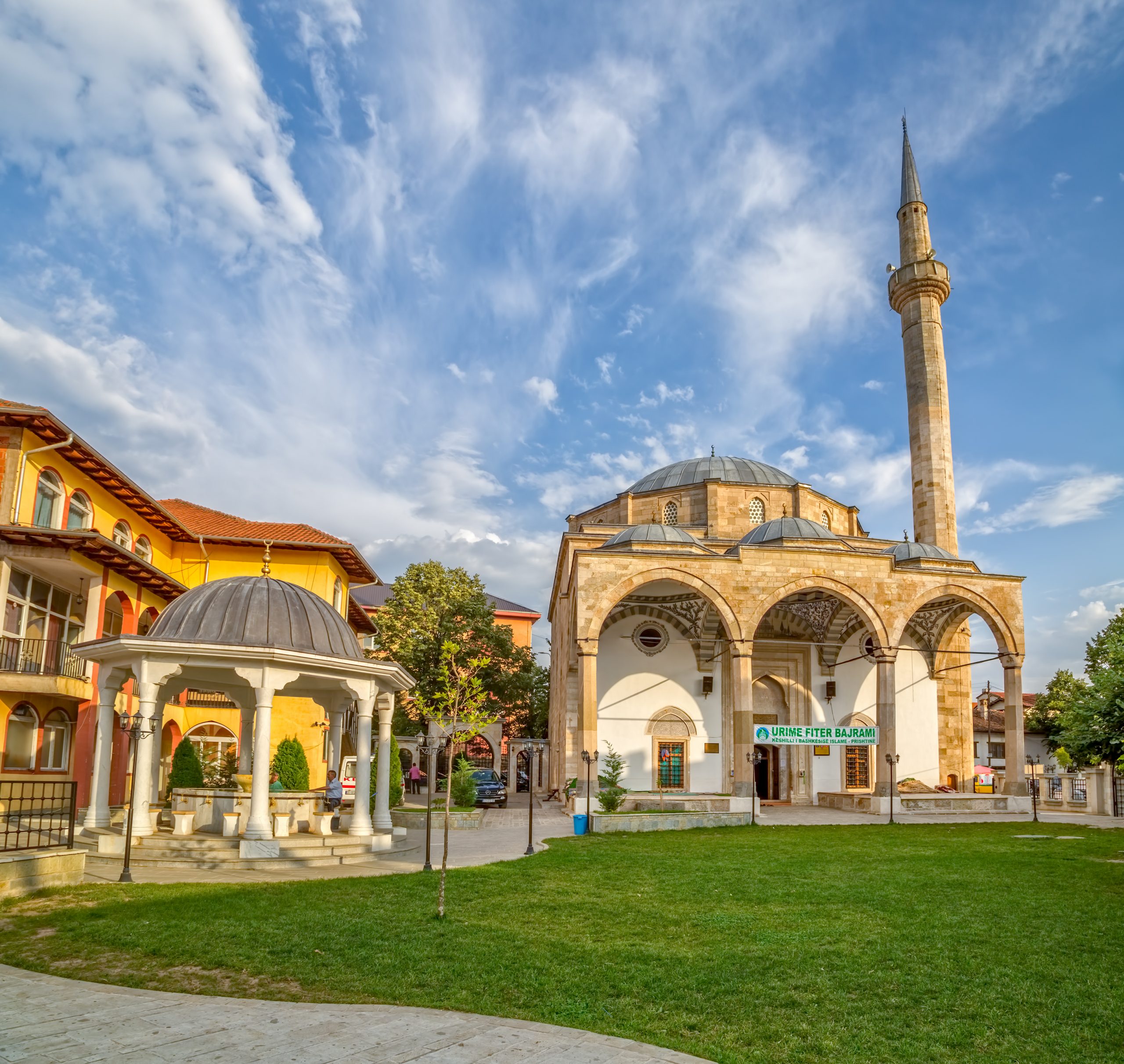Strategic Analysis Balkan Brief
First half of April 2024
Petra Bošková, Lýdia Chobotová,Victoria Mária Širocká, Zuzana Šmilňáková, Sára Gregová, Simona Škríbová, Barbora Tomanová

Photo: Shutterstock.com
Albania
Albania – Italy Migrant Agreement: Construction Challenges and Concerns Mount
On April 12, construction work commenced in Albania to establish a reception centre and camp aimed at accommodating migrants from Italy, marking a pivotal step in the contentious bilateral agreement between the two nations. However, as the project unfolds, it faces mounting criticism from activists, locals, and evolving logistical hurdles.
Initially slated for completion by May 20, the reception centre at Shengjin Port and the camp at Gjader, envisioned to collectively host up to 3,000 migrants, now confront delays. Recent reports from “La Republica” suggest that the anticipated opening date has been pushed back to November 10, highlighting the complexities involved in the construction process.
Budgetary concerns further compound the challenges. Originally estimated at 654 million EUR for the construction and operation over five years, there are apprehensions that the costs could escalate to a staggering 1 billion EUR. Such financial burdens underscore the scale of investment required for managing migrant influxes and the sustainability of long-term operations.
The agreement, unveiled in November 2023 by Albanian Prime Minister Edi Rama and Italian Prime Minister Giorgia Meloni, has ignited a firestorm of debate. While proponents argue for its expediency in processing asylum claims and relieving pressure on Italy’s shores, critics decry it as a violation of human rights and an imprudent allocation of resources.
The legitimacy and functionality of the proposed centres remain under intense scrutiny. Concerns linger over the treatment and rights of detainees, particularly regarding adherence to European laws and constitutional rights. Amidst these uncertainties, the urgency of addressing fundamental needs such as legal guidance, psychological assistance, and healthcare services cannot be overstated.
Local sentiments reflect a mix of apprehension and dissent. Residents in the vicinity of the proposed centres voice concerns over the potential impact on tourism, citing Albania’s limited capacity to absorb migrants and the strain on existing infrastructure. The absence of meaningful community consultations exacerbates these anxieties, underscoring a perceived lack of transparency and inclusivity in decision-making processes.
Activists like Arilda Lleshi are actively exploring legal avenues to challenge the agreement, highlighting its purported infringement on European legal norms and principles. The discontent underscores broader societal anxieties regarding migration policies and their implications on national sovereignty and social cohesion.
As construction progresses, stakeholders must address these multifaceted challenges with a commitment to transparency, accountability, and respect for human rights. The success of the Albania-Italy migrant agreement hinges on the physical completion of infrastructure and, fostering dialogue, addressing concerns, and upholding the dignity and rights of all individuals involved.
Sources:
- Euro News2024. “Migrants arrival in Lezha, camp’s opening is postponed. Euronews”. https://euronews.al/en/migrants-arrival-in-lezha-camps-opening-is-postponed/
- Sinoruka Fjori; Siviero Tommi. 2024. “Albania Builds Migrant Centre and Camp as Criticism Continues”. Balkan Insight. https://balkaninsight.com/2024/04/12/albania-builds-migrant-centre-and-camp-as-criticism-continues/
Bosnia and Herzegovina
Orban’s Diplomatic Visit: Strengthening Ties between Hungary, Bosnia and Herzegovina, and Republika Srpska
On April 3 – 4, Hungarian Prime Minister Viktor Orban paid a two-day visit to Bosnia and Herzegovina, during which he visited the country’s capital Sarajevo and Banja Luka, capital of Republika Srpska region. During his visit, Orban discussed bilateral cooperation in several areas with top officials of Bosnia and Herzegovina as Hungary prepares to assume the Presidency of the Council of the European Union later this year. The Hungarian Prime Minister also received a top award from the President of Republika Srpska, Milorad Dodik.
Upon arriving in Sarajevo, Orban met with BiH’s foreign minister, Elmedin Konakovic, and the prime minister, Borjana Kristo. The Presidency reported that its members and Orban discussed bilateral cooperation in education, culture, agriculture, energy, telecommunications, and other areas. Furthermore, the Presidency stated that the European Union’s decision to open accession negotiations with BiH incentivises the country to persist in its reform process.
Expectations have been expressed that there will be progress in the integration process of Bosnia and Herzegovina into the EU during the Hungarian Presidency of the Union in the second half of 2024. Moreover, both parties agreed that the first intergovernmental conference would be held as soon as possible.
Orban arrived later in Banja Luka, where he was greeted by Milorad Dodik, the pro-Russian president of Republika Srpska. The Serb-dominated entity and Hungary held a joint Economy Forum, during which Hungary and Republika Srpska agreed to cooperate on energy projects worth 140 million EUR.
The agreement on energy projects was reached before the forum’s opening ceremony, with 23 Hungarian companies in attendance. These projects will be implemented in cooperation with Hungarian companies such as MBM and Alteo.
The energy cooperation encompasses three projects: 1) a solar power plant in the town of Trebinje, 2) a wastewater treatment plant in Gradiska and 3) the construction of a wind farm. The wind farm project was initially financed by the German government, but Berlin withdrew due to the secessionist politics of Republika Srpska. No further details regarding the terms of cooperation have been provided yet.
On April 3, the Hungarian Prime Minister received the entity’s top medal, the Order of Republika Srpska, awarded to him on the Day of Republika Srpska on January 9 this year. The same award was previously bestowed upon Russian President Vladimir Putin a year earlier.
Dodik stated during the ceremony in January that „This is a source of pride for Republika Srpska and of gratitude towards a man who is willing to acknowledge us as a legitimate political entity.”
Dodik and Orban share a longstanding partnership. Among EU countries, Dodik can rely on Hungary most for support. Hungarian policy toward the Western Balkans aligns with Putin’s agenda, and Orban has consistently stated his intention to veto any EU efforts to impose sanctions on the pro-Russian Bosnian Serb leader Dodik.
Sources:
- Euro News2024. “Migrants arrival in Lezha, camp’s opening is postponed. Euronews”. https://euronews.al/en/migrants-arrival-in-lezha-camps-opening-is-postponed/
- Sinoruka Fjori; Siviero Tommi. 2024. “Albania Builds Migrant Centre and Camp as Criticism Continues”. Balkan Insight. https://balkaninsight.com/2024/04/12/albania-builds-migrant-centre-and-camp-as-criticism-continues/

Photo: Shutterstock.com
Kosovo
Kosovo census starts amid boycotts by Kosovo Serbs
Kosovo is holding a population census for the second time in its history. However, Kosovo Serb parties, mainly the Belgrade-backed Srpska Lista, boycott the “fake” census on the grounds of Kosovo PM Kurti´s government trying to confirm its “successful expulsion” of Serbs from Kosovo, even calling it ethnic cleansing. Srpska Lista, along with other Kosovo Serb parties, call upon the Kosovo Serbs to also boycott the census and refuse to give any data to the government.
The reason for the boycott is based on the Kosovo Serbs’ dissatisfaction with Kurti´s government, claiming alleged denial of pensions and wages, the takeaway of the right to vote, persecution of Serbs, forcible occupation and militarisation of the municipalities in northern Kosovo. These claims, however, have not been backed by any evidence.
Kurti argues the census not only maps the size of the population, levels of education, employment and number of households in Kosovo but also aims to map the citizens´ needs, as it also maps the property damaged during the separatist war against Serbian armed forces and whether they have relatives who died or were tortured at the time. The census also aims to register the Kosovo diaspora, roughly estimated at half a million. The census is conducted by circa 2,700 census collectors who will visit people´s homes until May 17. If a citizen refuses to take part in the census, they can be fined 200 to 2,000 EUR fine, depending on the reason for refusal.
The EU and the OSCE urge Kosovo to intensify the information campaign about the census for all citizens, especially in minority communities. The OSCE highlights that low participation of minorities would mean “further repercussions, including budgetary consequences at the municipal level”, thus potentially worsening the already tense situation in northern Kosovo.
Sources:
- Xhorxhina Bami, Balkan Insight, “Kosovo Starts Census as Serb Parties Call for Boycott”, https://balkaninsight.com/2024/04/05/kosovo-starts-census-as-serb-parties-call-for-boycott/
- Deutsche Welle, “Kosovo begins first census in over 10 years”, https://www.dw.com/en/kosovo-begins-first-census-in-over-10-years/a-68747684
- Perparim Isufi, Balkan Insight, “Kosovo Urged to Address Concerns About Census Amid Serb Boycott”, https://balkaninsight.com/2024/04/10/kosovo-urged-to-address-concerns-about-census-amid-serb-boycott/
- Alice Taylor, EURACTIV, “Dominant Kosovo Serb party again boycotts local elections, census in north”, https://www.euractiv.com/section/politics/news/dominant-kosovo-serb-party-again-boycotts-local-elections-census-in-north/
Montenegro
Former Montenegrin Special Prosecutor Arrested on Organized Crime Charges
Former Montenegrin Chief Special Prosecutor Milivoj Katnic and former Assistant Director of the Police Zoran Lazovic were apprehended by police authorities on April 14, facing charges related to organised crime. The arrests, ordered by the Special Prosecutor’s Office, resulted in both individuals being detained for up to 72 hours.
Lazovic stands accused of orchestrating a criminal syndicate, as per statements from his legal representatives, while Katnic faces suspicion of involvement in the said organisation, alongside charges of abusing his official position. Allegations suggest Lazovic facilitated the entry into Montenegro of two Serbian members affiliated with the notorious Kavača crime clan, Veljko Belivuk and Marko Miljkovic, in 2020, with purported assistance from Katnic. However, Lazovic’s lawyer, Stefan Jovanovic, neither confirmed nor refuted these claims, emphasising that the ongoing investigation stemmed from previously publicised information lacking substantial evidence. Despite maintaining his innocence, Lazovic opted to withhold responses to prosecutors’ inquiries, citing the sensitive nature of the situation.
Moreover, Belivuk and Miljkovic face trials for several homicides in Montenegro, and they are implicated in the abduction and subsequent murder of Mileta Radulovic, a member of a rival clan, who was killed after two months of torture.
The investigation into Lazovic and Katnic spanned several months in collaboration with EUROPOL, indicating the gravity of the allegations and the extent of international cooperation in combating organised crime. Interior Minister Danilo Saranovic said that law enforcement conducted searches across eight locations used by Lazovic and Katnic in Bijelo Polje, Danilovgrad and Podgorica. The arrests received widespread approval, with government officials such as PM Milojko Spajic and President Jakov Milatovic expressing support for the Special Prosecutor’s Office’s relentless pursuit of justice. Former prime minister Dritan Abazovic, who had accused Katnic and Lazovic of being “at the top of the criminal pyramid in Montenegro” when in government, praised the move as well. However, The Democratic Party of Socialists countered that the arrests were a political retaliation meant to make the previous administration it headed illegal. According to Supreme State Prosecutor Milorad Markovic, all institutions have a responsibility to establish the rule of law, and everyone should cooperate while staying within their own areas of expertise.
Katnic’s tenure as Chief Special Prosecutor from 2015 to 2022 was marked by notable achievements, including high-profile arrests and prosecutions of a former high-ranking DPS official, Svetozar Marovic, but his involvement in contentious cases, such as the alleged coup attempt against the DPS government in 2016, stirred controversy and accusations of political bias. The indictment issued by Milivoj Katnic encompassed Russian and Serbian nationals, along with two Montenegrin leaders from the former Democratic Front, including Andrija Mandic, the current president of Montenegro’s Parliament, and Milan Knezevic, president of the Democratic People’s Party. Initially sentenced to several years in prison, the Court of Appeal overturned the verdict, resetting the legal process. Katnic faced accusations of favouring the Democratic Party of Socialists (DPS) and shielding former DPS leader Milo Djukanovic.
Meanwhile, Zoran Lazovic, who previously oversaw the Police’s anti-organised crime sector until his dismissal in March 2021, faced allegations of ties to criminal groups despite his extensive career in law enforcement and intelligence agencies. The past two years have seen multiple arrests of judicial and law enforcement figures on orders from the prosecutor’s office, including Vesna Medenica, former Supreme Court president, former police directors Veselin Veljovic and Slavko Stojanovic, deputy police director Dejan Knezevic, and Milivoj Katnic’s assistant in the Special Prosecutor’s Office, Sasa Cadjenovic.
Sources:
- Borislav, Visnjic. Balkan Insight,” Montenegro Ex-Chief Prosecutor, Ex-Police Boss, Face Organised Crime Charges” https://balkaninsight.com/2024/04/15/montenegro-ex-chief-prosecutor-ex-police-boss-face-organised-crime-charges/
- EWB, “Former Montenegrin Special Prosecutor and high-ranking police officer arrested”, https://europeanwesternbalkans.com/2024/04/15/former-montenegrin-special-prosecutor-and-high-ranking-police-officer-arrested/

Photo: Shutterstock.com
Serbia
France and Serbia Agree On Significant Fighter Jet Deal To Enhance Belgrade’s Air Capabilities
Serbia is expected to sign a 3 billion EUR deal with France to purchase 12 Rafale fighter jets from Dassault Aviation. This would mark the largest weapons deal in Serbia’s modern history and a long-term commitment to the West after decades of relying on Russian aircrafts.
The deal comes as Russia wages war in Ukraine. While refusing to join Western sanctions against Russia and keeping Serbia open for Russian business, President Aleksandar Vučić has faced increasing pressure from Europe and the USA.
Vučić acknowledged the Ukraine war has “hastened diversification” for Serbia, as the country traditionally relied on Soviet-era technology, and it is now unfeasible to procure from Russia due to geopolitical circumstances. The Rafale contract should be signed within two months in the presence of French President Emmanuel Macron.
President Macron has adopted a hawkish stance on the threat to European security if Russia is not defeated in Ukraine. His outreach to Vučić and support for Serbia’s EU membership is part of a strategy of focusing on countries formerly in Russia’s sphere of influence.
Macron emphasised expanding Franco-Serbian relations, including defence contracts and energy projects, while also urging Serbia to take concrete steps to get closer to the West, such as aligning with EU foreign policy and recognising Kosovo’s statehood. However, sceptics have cautioned Western nations about arming Serbia, given the progressively strained ties between the country and Kosovo, whose 2008 proclamation of independence has been rejected by Belgrade.
The Serbian official noted a change in tone from Paris, previously uninterested in the region, highlighting the Rafale deal as an important milestone: “Paris was not particularly interested in this part of Europe before. But that has changed (…) The Rafale is an important milestone, but not the whole story.” Serbia has also purchased French radar and missile systems, with the aim of maintaining air force prowess as its Soviet MiG-29s near the end of their lifespan.
Over the past few years, Serbia has purchased weapons and military systems from various other countries, such as the USA, Canada, Germany, Spain and Russia, as well. According to the Stockholm International Research Institute’s findings, Serbia’s military spending surpassed that of other Western Balkan nations, with the country investing upwards of 1.3 billion EUR in its defence sector from 2018 to 2022.
Sources:
- Baletic, K. Serbia Agrees Deal to Buy French Rafale Fighter Jets. Balkan Insight. https://balkaninsight.com/2024/04/09/serbia-agrees-deal-to-buy-french-rafale-fighter-jets/
- Dunai, M., & Abboud, L. Serbia to buy French fighter jets in pivot away from Russia. Financial Times. https://www.ft.com/content/fa26d185-6b54-481a-b5b8-1ff41a0ab724
- RFERL, In Major Upgrade Of Serbian Air Force, Vucic Agrees Jet Deal With France. Radio Free Europe. https://www.rferl.org/a/vucic-macron-kosovo-fighter-jets-nuclear-power/32897037.html
North Macedonia
Changes in the Electoral Law passed amidst the Election Campaign
The presidential campaign for the elections, scheduled for April 24, intensified while the May 8 parliamentary elections campaign is starting in North Macedonia. Currently, the candidates with the highest chances of entering the second round of the presidential elections are the current president, Stevo Pendarovski, coming from the Social Democratic Union of Macedonia party (SDSM) and Gordana Siljanovska-Davkova from the biggest opposition party VMRO-DPMNE.
During the rallies, President Pendarovski accentuates SDSM’s involvement with the European Union. On April 13 in Tetovo, Pendarovski addressed the crowd with statements regarding the country’s potential accession to the European Union, which he believes can be completed in 4,5 years if there are no domestic constraints. He perceives the Euro-Atlantic integration and interethnic coexistence as the key principles that led the SDSM’s rule over the past years in power and expressed intention to continue this path.
Pendarovski stated that, in his view, the biggest obstacle to the country’s integration into the European Union was the opposition of domestic actors to needed reforms. His rival, Siljanovska-Davkova, offered a dissenting opinion during her rally on April 13 in the Skopje municipality of Karposh. Siljanovska-Davkova believes, that the European Union should have helped the country more, although she admitted that the reforms were also lacking in implementation. Furthermore, Siljanovska-Davkova blamed the European Union for not offering membership to the Balkan countries earlier.
While SDSM and VMRO-DPMNE are fighting for voters at campaign rallies, the two parties united in the Parliament in voting for the changes to the electoral code. Even though many of those changes were warranted, the Parliament also changed the bar for the independent candidates. Instead of the previous requirement of amassing a minimum of 1,000 signatures to be a part of the election, candidates now need to gather signatures of 1 per cent of registered voters in their electoral districts.
This surprise move comes after the success of the independent candidates in the 2021 local elections when civic organisations such as Green Human City from Skopje or Better for Tetovo won seats in many of the country’s municipalities.
Sources:
- Ivan Kolekevski, MIA, “Pendarovski: EU negotiations to be completed in 4,5 years barring domestic obstructions”, https://mia.mk/en/story/pendarovski-eu-negotiations-to-be-completed-in-45-years-barring-domestic-obstructions
- Ivan Kolekevski, MIA, “Siljanovska Davkova urges women to be increasingly involved in politics”, https://mia.mk/en/story/siljanovska-davkova-urges-women-to-be-increasingly-involved-in-politics
- Sinisa Jakov Marusic, Balkan Insight, “North Macedonia Big Parties Squeeze Independents Out of Election Races”, https://balkaninsight.com/2024/04/11/north-macedonia-big-parties-squeeze-independents-out-of-election-races/

Contact us